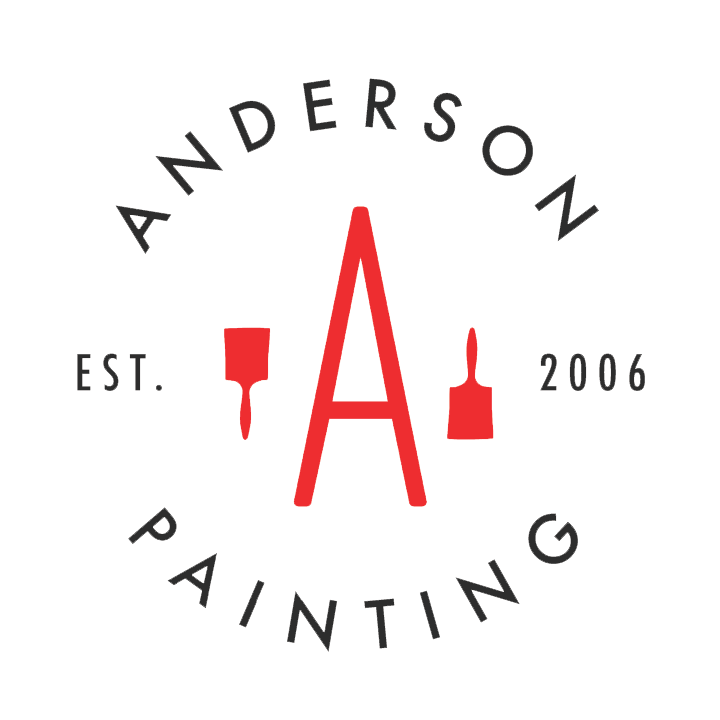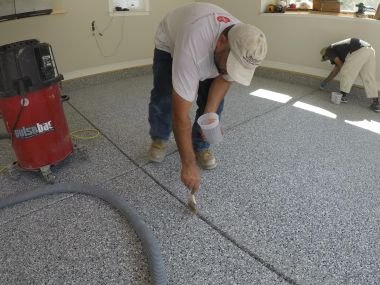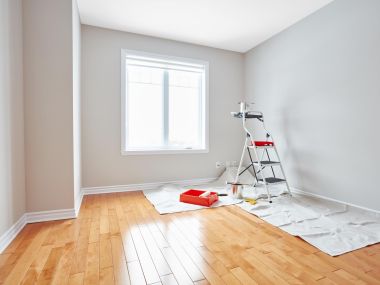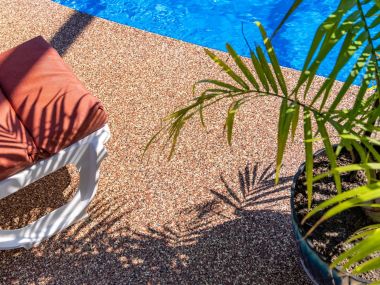Polyurea vs Epoxy: Comparing Concrete Floor Coating Options

Polyurea and epoxy are two popular concrete floor coating options. If you're considering one of these two coatings for your concrete floor, we'll compare them in this article to help you make an informed choice.
Choosing a Concrete Floor Coating
When your concrete floor shows signs of wear and tear, such as cracking, chipping, or staining, it might be time to install a new, durable coat. The next step is to decide which type of floor coating is best for your floor. Having options is good, but it can be difficult to make a decision between the various types of concrete floor coatings.
The most common flooring options are epoxy and polyurea. Of course, there are various subcategories and application methods within these two categories. Because of this, the primary question for most people ends up being, “Is polyurea better than epoxy?”
Polyurea vs Epoxy: A Comparison
To keep things simple, let's broadly examine epoxy and polyurea floor coatings, including their similarities, differences, and which option is better for different scenarios.
Epoxy Floor Coatings
An epoxy paint coating is more of a glue than a type of paint. That said, these coatings often look like paint and come in various colors, just like paint. Also, like paint, epoxy coatings aren't just meant to make your floor look fresh and bright but also to protect its surface from all kinds of damage. Concrete floors are susceptible to impact damage, water and chemical damage, vapor transmission, thermal shock, and much more. A proper, thick epoxy coating will strongly adhere to the concrete and keep these various forms of damage at bay.
Not all concrete floor paint is the same, of course. Without getting too deep in the weeds, epoxy coatings come in three main types: water-based, solvent-based, and 100% solids. As you might have guessed, 100% solid epoxy is the thickest, most durable, and most expensive option, while the other two types are a bit cheaper, thinner, and less durable, though they still get the job done if installed properly.
On that note, epoxy floor coatings are relatively easy to apply, and it only takes professionals about a day (or less) to get the job done. Depending on the size of your floor and the type of epoxy coating, it may take another day or a couple of days for the coat to completely dry and cure.
In terms of cost, epoxy is cheaper to install than polyurea. However, you'll also need to pay for regular maintenance and possibly touch-ups. This coating will usually last five to ten years at most, necessitating more frequent recoating. So, the total cost adds up over time, diminishing the initial savings.
Polyurea Floor Coatings
While serving the same purpose as epoxy floor coatings, polyurea coatings have distinct advantages and a few drawbacks of their own. Polyurea is a flexible, synthetic material used for a number of products and purposes, such as lining tanks and trucks. The material is just as useful for concrete floors, as it quickly and strongly bonds to concrete while providing a smooth, virtually impermeable surface that protects the floor from impact, water damage, chemicals, heat, and sunlight.
In terms of overall durability and flexibility, polyurea wins over even the strongest epoxy material. Because it's so flexible, the material can move with the concrete when there are major shifts in weight or temperature. Of course, all of this durability comes at a cost, and polyurea coatings are typically more expensive than their epoxy counterparts.
As far as installation goes, polyurea cures extremely quickly. This can be good or bad, depending on your perspective. If you don't know what you're doing, it's easy to make a mistake and risk needing to undo your progress and start again (which is costly). That's why it's best to hire a professional contractor with experience in polyurea floor coatings. They'll get the job done quickly and properly so you can enjoy your new, durable floor.
In the polyurea coating vs. epoxy debate, polyurea comes out as the more expensive option, but despite the higher initial investment, it's generally a more economical choice over time. This coating material boasts a lifespan of approximately 15 years. It can also retain its superior performance and aesthetics over time with just minimal maintenance. All these characteristics not only justify the higher upfront cost but also make it a worthwhile investment over the long term.
Making a Decision
Based on the comparison above, it's apparent that polyurea wins in terms of durability, flexibility, and longevity. Its minimal maintenance requirements can also be quite attractive, especially to those who just don't have the time for the task.
Polyurea is undeniably superior to epoxy in various areas. If you're comparing polyurea vs. epoxy for your garage floor, polyurea may end up being the better option. It's less susceptible to damage and can resist high impact from vehicles.
However, polyurea coatings cost a few times more than epoxy. Those with budget restrictions often choose epoxy. You may even save more initially by handling the application yourself. As long as you properly prepare the surface, pay attention to ambient and surface temperatures, and follow the manufacturer's instructions, you will likely get quality results. So, for those who want to know if epoxy is better than polyurea, the answer is yes in terms of upfront cost and ease of installation.
Polyurea vs Epoxy: Which Is Better?
Every contractor you ask will probably give you a slightly different answer when you ask them which is better: epoxy or polyurea coating.
It's a subjective issue since different customers require different solutions for their unique floors and situations. Many factors are in play, such as floor type and function, budgetary concerns, aesthetic preferences, and much more.
At Anderson Painting, our vote is for polyurea, which is why Anderson Painting contractors are experienced in applying Penntek polyurea floor coating solutions. We believe this process is the best option for all concrete floors, residential and commercial.
To learn more about our flooring options and process, call Anderson Painting today at 919-610-1855 or email us at info@andersonpaintingnc.com!




